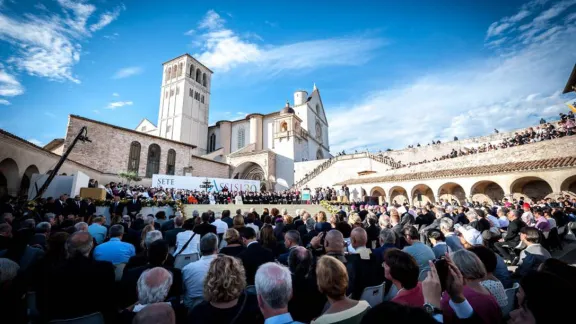
LWF General Secretary Rev. Dr Martin Junge attended the World Day of Prayer for Peace, in Assisi, Italy. Only by relinquishing their greed and perceived freedom to expoit natural resources at will would human beings secure the future of life, he said. Photo: Catholic Community of SantâEgidio
LWF General Secretary Junge participates at inter-religious gathering in Assisi
(LWI) – Together with religious leaders of different faiths, The Lutheran World Federation General Secretary Rev. Dr Martin Junge met this week in Assisi, Italy, for the inter-religious prayer meeting. Under the motto “Thirst for peace: Faiths and cultures in dialogue” 450 faith leaders of Christian, Muslim, Buddhist, Jewish, Hindu and other communities convened to discuss and pray together.
The “World Day of Prayer for Peace” was initiated by Pope John Paul II in 1986. He chose the birthplace of St Francis, the Catholic saint renowned for his tolerance, after whom the current pope also chose his papal name.
The conference organized by the Catholic Community of Sant’Egidio from 18-20 September 2016 took place at the same time as the initial session of the UN General Assembly in New York focusing on refugees. In their prayer on the last day, faith leaders also lit a candle for 27 countries experiencing war and violence today, among them Syria, Iraq, South Sudan, Burundi, Colombia , Mexico Nigeria, Ukraine and Mindanao in the Philippines, Yemen.
Pope Francis attended personally the second day of the meetings. Together with the Ecumenical Patriarch of Constantinople, Bartholomew, and the Archbishop of Canterbury Justin Welby, he led the prayer service for peace in the Cathedral of Assisi. In his reflections, he challenged the “new paganism of indifference” that turns a blind eye on the suffering of people. He called upon the churches to uphold a discourse and a practice of love.
Trust and friendship
“In the development of this initiative one can see how interfaith relationships grow and mature,” the LWF General Secretary said. “This is an effort sustained for 30 years: after three decades trust and friendship have developed, and relationships matured. Once this stage is reached, deeper conversation and honest exchange are made possible. ”
I believe this is therefore the question that humanity faces today, an extremely challenging question on which its long-term survival will depend: it is not anymore by showing its ability to grab and to hold fast that humanity will proof its viability and secure its existence, but by its ability to let go. Not anymore by grabbing, as it has been quite normal in the past and until today, but by letting go will the future of life be secured.
LWF has a long history of inter-religious dialogue and engagement. After the LWF General Assembly in 1984 a desk on the church and people of other faiths was established, which since then has continuously held dialogue meetings with people from the major religions traditions as well as a study process on indigenous spiritual traditions in different regions.
Recently, the question of how religious communities live together in a shared public space has become a focal point of the LWF’s initiated interreligious conversations. In face of discrimination, joint affirmation of a just legal framework that ensures equal rights for all has become an important concern for religious scholars. In 2014, the LWF signed a Memorandum of Understanding with Islamic Relief Worldwide to jointly collaborate in the field of humanitarian work. That cooperation has led to joint project implementation, for instance in Nepal and Jordan.
Secure the future by guarding creation
During the three day prayer meeting, the LWF General Secretary participated in a panel discussion about “Religions as safeguards of creation”. He appealed for better stewardship of creation by letting go of the greed and the perceived freedom to exploit natural resources at will.
“Not anymore by grabbing, as it has been quite normal in the past and until today, but by letting go will the future of life be secured,” he said.
“I am fully convinced that faith has a pivotal role in promoting and sustaining those required changes that are ahead of us,” he said. “Because there is this insight of faith that comprehends that in giving away, by letting the grain go back to the earth, new life is made possible,” Junge concluded.


